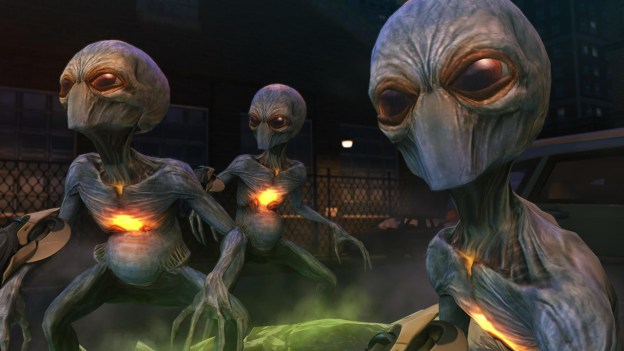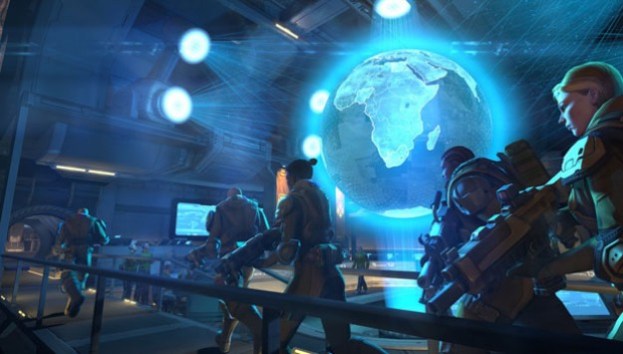
XCOM: Enemy Unknown is going places. The unexpected 2012 hit accomplished the impossible by delivering a turn-based strategy game that didn’t just work on consoles but did things better than on PC. Now, Firaxis and 2K China are getting ready to step into a larger world of small screens. XCOM is headed to iOS devices this summer, and console/PC lead Jake Solomon is guiding the development of the port as a different studio works to shape an entirely new control interface for the game.

For Solomon, porting Enemy Unknown represents an important step forward in the realm of serious gaming on mobile devices. He considers himself to be a “core” gamer, and while he’s excited by touchscreen play in games like The Walking Dead, Minecraft, and Ridiculous Fishing (“a great, great game,” he adds), he also recognizes that an XCOM port is a different proposition. “We’re really excited because what we’re doing is an up front purchase for the game,” Solomon tells us. “No microtransactions or anything like that. It is sort of new ground… the ability to give people a premium game on the iPad. We’re excited to see how people respond to it.”
To be clear, “premium” doesn’t automatically translate to “boxed release pricing.” 2K Games is still working out the exact price of the iOS version of Enemy Unknown, but will the number be comparable to PC/console editions? “Probably not,” he says. “I think it will be priced appropriately.”
The mobile edition of XCOM: Enemy Unknown will be a content-complete port of the single-player campaign. A 2K representative tells us that multiplayer mode support is “the goal,” but it’s not something that will be around at launch. The same goes for DLC: The port will only include content that the game launched with initially, but that doesn’t mean subsequently released add-ons like Slingshot or The Second Wave are being left behind.
“The DLC we’ve done won’t be included in this game,” Solomon confirms. “The model for delivering more content to it, that’s a really good question. We’re doing the up front pricing, but then how do we add in extra content? That’s something we’re just now wrapping our heads around.”
The touch-enabled user interface is also still being ironed out, with Solomon working alongside the 2K China team to ensure that the controls are a good fit for the platform. “Obviously touch controls are really natural with XCOM. The first time touch controls went in, people were intuitively able to pick it up and play,” he says. The basic interface is immediately familiar to look at on Solomon’s demo iPad – a non-finalized version, to be clear – with the only difference being that you’re tapping and swiping instead of using a peripheral.

“XCOM is not an action game [so] the interface is hugely important to the player’s experience. Doing two different interfaces… was actually, by far, one of the most challenging parts of our development process,” Solomon adds. “You have to have completely different ways to access the same functionality. This [iOS release] will end up being the third one. It inherits a bit from mouse and keyboard, but it’s a completely different interface obviously. It feels really, really natural. I like not just the convenience of having it on the iPad, but the ease with which you can play.”
Impressively, the thing that doesn’t look much different is the overall presentation. This port of Enemy Unknown falls close, visually, to its siblings on other platforms. There are some up front and behind the scenes changes to make the game more friendly with the lower-powered Apple devices. Exactly which ones will be supported is still being figured out, but the immediate eyes-on impression is a positive one.
“All of the assets are the same [as they were in previously released versions], but we did have to knock down polygon count, texture resolution,” Solomon explains, noting that the team had to sacrifice some features to decrease game file size. “In order to fit this onto iOS devices, we had to remove some of the maps from the rotation… but there are still more maps than you would encounter in a single playthrough.
“It’s really remarkable; a lot of credit goes to the Unreal engine as well, because it really is the same assets and we just had to knock them down for size sake.”

With 2K China handling most of the work on this Enemy Unknown port, a fan can’t help but wonder what Solomon and his team are up to at Firaxis headquarters. “There’s definitely more to come,” he teases at the possibility of more DLC. “For us, our games are platforms that we support for a long time.” That’s not all though. Thoughts are also turning toward what might come next. Enemy Unknown was a great success, but the fact that it was effectively a faithful remake of the first game in a series means there are important questions to weigh in any forward-looking conversation.
“In some ways it was a safety blanket to say ‘Okay, we’re going to reimagine this game that I love.’ Even if the mechanics changed, the creative vision is still there. Whenever you’re in trouble, you’ve got an anchor to hold onto,” Solomon explains. “So it’s interesting now to look at that.”
He’s absolutely, 100 percent clear on one thing though.

Solomon readily admits that the 1995 game has its fans, but for him that game represents a break from the fundamental ideas from the original that so heavily influenced him as a young game.
“[UFO: Enemy Unknown] affected me so much because it’s in a modern setting with buildings and people you recognize. Terror From The Deep was very Lovecraftian [and set] under the water. The aliens didn’t seem alien,” he explains. “When you see aliens [in Enemy Unknown], they seem very alien. They’re standing in the middle of the street, they’re in the middle of all these things that have this emotional resonance for you as a person. Whenever it was under the water, it just felt like a super far-out sci-fi game, and I think it stole some of the thunder from the aliens.”
So Terror From The Deep isn’t what’s next, but something is. Solomon just isn’t sure what quite yet. “It really is an interesting position, to be so successful at reimagining something and [then ask] what’s the next step? How do you think about it creatively? Have we made our mark? Is it now time to take it in a new direction?” he says. “I think that it’s comforting to have something like the original game to lean on. There’s an answer there somewhere, I just need to find it.”


